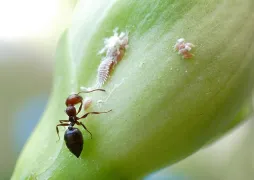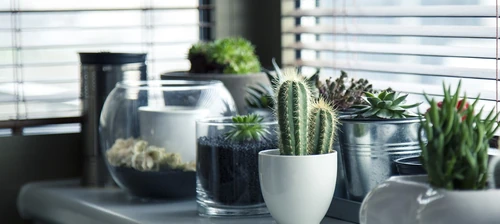Crassula capitella 'Campfire', the all-round succulent
Crassula capitella 'Campfire' won't set the dancefloor alight, but it is capable of setting your succulent bed ablaze. With its orange-red, campfire-like foliage, this Crassula capitella cultivar will bring a touch of warmth and light to your succulent collection.
How to recognize Crassula capitella 'Campfire'?
Crassula capitella 'Campfire' is a succulent with a bushy, prostrate habit. It grows to a height of 15 cm. Its stems form dense mats on the ground and can spread over a metre.
The thick, fleshy leaves are helix-shaped. They change from light green to brilliant shades of yellow, orange and red whenthey get enough sun.
Small white or cream flowers appear in clusters in summer or autumn.
Crassula capitella 'Campfire' is not toxic to pets. It may cause vomiting in cats and dogs if ingested, but poses no health risk. Nor is it dangerous to humans. You can handle it without wearing gloves or worrying about skin irritation.
Our maintenance tips
Crassula 'Campfire are very slow-growing. So you won't have to take them home very often. But you will have to be patient to see new leaves appear!
Watering
Make sure the soil is completely dry before watering. Pour room-temperature water over the potting soil, without wetting the foliage.
Do not leave standing water in the cup.
Do not leave standing water in the cup.
Spray
Crassula 'Campfire grow in arid regions and do not like humidity. No need to spray them.
Repotting
Every spring, repot your Crassula capitella ‘Campfire’ to give it more space.
Choose a pierced pot and line the bottom with a layer of clay balls or gravel.
Then pour in a draining substrate, such as potting soil for cacti and succulents, or potting soil for green plants enhanced with sand and perlite.
Plant your Crassula 'Campfire and add substrate if necessary. Water to remove air bubbles and encourage rooting.
Fertilization
To promote the growth of your Crassula capitella ‘Campfire’, apply fertilizer in spring and summer.
Add cactus and succulent fertilizer to watering water.
If you're repotting every year, there's no need to add fertilizer. Your plant will find sufficient nutrients in its substrate.
Plantation
When the risk of frost has passed, it's time to plant.
Crassula 'Campfire love light, but dread direct sunlight, especially in the hottest hours. To ensure that your plant gets plenty of light without damaging its foliage, choose a location with half-shade or bright indirect light.
Dig a hole slightly larger than the root ball. Plant your Crassula 'Campfire and backfill.
Water withoutsoaking the soil to encourage rooting.
Cutting
Cutting is carried out during the strong growth phase, generally in spring and early summer.
Locate a healthy, flowerless stem. Using clean, sharp pruning shears, remove a section about ten centimeters long.
Remove the leaves at the bottom of the stem. Leave to dry for at least 24 hours, until a callus forms at the base.
Choose a pierced pot suited to the size of your cuttings. Choose a terracotta model. This material promotes uniform drying of the soil and reduces the risk of root rot.
Line the bottom with a bed of clay balls or gravel. Then pour in a substrate made up of equal parts potting soil, garden soil and sand. Plant your cutting and tamp it down. You can add a layer of sand to the surface.
Place your cutting in a bright spot away from direct sunlight. The temperature should be at least 18 degrees.
Disease / Threat
Information
| Family | Crassulaceae - Crassulaceae |
| Type | Crassula - Crassula |
| Species | Crassula capitella - Crassula capitella |
| Lifecycle | Perennial |
| Foliage | Evergreen |
| Exposure | |
| Substrat | |
| Planting method |
In pots |
| Category | |
| Tags |
Beginner Small pot |
| Origin |
South Africa |
| Hardiness (USDA) | 9b |
| Leaf color |
|
| Flower colors |
|
Discover plants from the same family
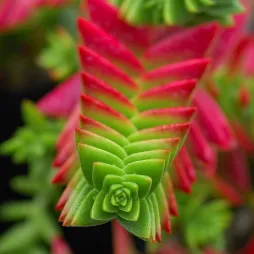
Crassula capitella
Discover
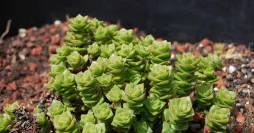
Crassula capitella thyrsiflora
Discover
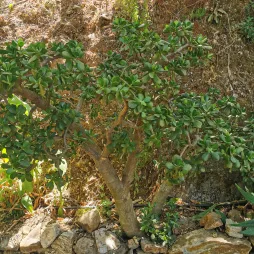
Jade tree
Discover
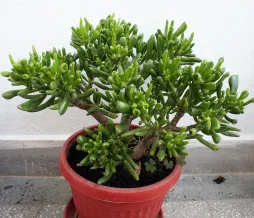
Crassula ovata 'Hobbit
Discover













